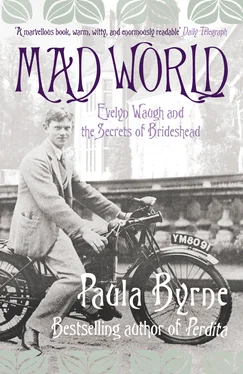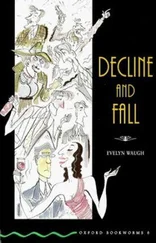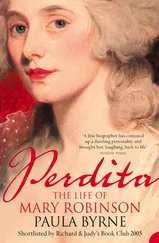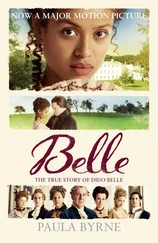J. F. was a god to nearly all the Lancing boys. At the age of thirty-one he had returned from the war a hero, having been Mentioned in Dispatches and recommended for the Military Cross. He later became the first headmaster of Stowe. It was not difficult to see the attraction. He was handsome, willowy and elegant, and physically strong. Evelyn would always be drawn to this type of physique, so unlike his own. J. F. cut an immensely dashing figure with his colourful hand-woven ties and stylish suits. He liked to make a studied late entrance to chapel dressed in his Sorbonne robes. He was a man of great charisma: witty, charming and learned.
He had a beautiful, sonorous voice and it was a joy, said Evelyn, to hear him declaiming Latin ‘like a great Negro stamping out a tribal rhythm’. Over forty years later, in A Little Learning , Waugh remembered it as a voice that set up ‘reverberations in the adolescent head which a lifetime does not suffice to silence’. J. F. didn’t just walk into a room: his entry was always a moment of exhilaration. Evelyn, conversely, had a curiously ungainly walk, a kind of trudge that caused his friends to make jibes about trench foot.
Even whilst invigilating exams, J. F. was unlike the other teachers who sleepily turned over their textbooks. He, by contrast, appeared ‘always jaunty and fresh as a leading actor on the boards, in the limelight, commanding complete attention’. Evelyn was also drawn to J. F.’s love of language, his dislike of cliché and slang, his attention to precision in grammar. In the boys’ essays ‘oo’ in the margin stood for ‘orribel oxymoron’ and ‘ccc’ for ‘cliché, cant or commonplace’. Other comments would include a devastating ‘Excellent journalism, my dear fellow.’ J. F. used unusual words and phrases, to amuse as well as to educate the boys. Poor reading was a ‘concatenation of discordant vocables’. His examination papers were elegantly printed and instead of the perfunctory termly report, he wrote long letters home to parents on hand-woven paper embossed with his name. Evelyn’s lifelong disdain for printed as opposed to engraved postcards perhaps came from here.
‘Always, in whatever he did, was the panache.’ Evelyn was forever drawn to style, even if he felt that he lacked the quality himself. He loved good manners and civilised, cultured people, even though he himself could be rude and abrasive. This contradiction in his personality never changed – later in life, when he was asked why he was so vile despite his religious temperament he replied: ‘Imagine how much worse I would be if I wasn’t a Roman Catholic.’
J. F. was not overtly religious. He was ‘reticent about his scepticism’, though would throw in to the school debating society the occasional doubt about life after death that was bewildering to Evelyn. His doubts about God were rooted in the horrific sights he had seen on the Western Front. A stern moralist with a keen work ethic and no time for waste or frivolity, Roxburgh seemed rather like an eighteenth-century Anglican bishop without any of the theological baggage.
‘Most good schoolmasters – and, I suppose, schoolmistresses also – are homosexual by inclination,’ observed Waugh – ‘how else could they endure their work?’ His diary records an incident in which J. F. was supposedly caught embracing a boy in his study, but in his memoir he maintained that his teacher was not actively homosexual, though given to intense romantic friendships typical of the time. So called ‘Greek love’ could have a respectability and innocence, especially for a man such as Roxburgh, whose virility, military demeanour and style by no means conformed to the Wildean homosexual stereotype.
Evelyn was alert to the fallacy of sexual stereotyping: ‘Mr Crease … was effeminate in appearance and manner; J. F. was markedly virile, but it was he who was the homosexual.’ Waugh and his contemporaries believed that J. F. fell in love with individual boys, though without ‘physical release with any of his pupils’. One of those he loved was a ‘golden-haired Hyacinthus’. J. F. gave the boy a motorcycle. In no time the lad was thrown from it and facially disfigured. J. F. remained close to him until the boy’s premature death.
Evelyn was not a particular favourite, although J. F. invited him to tea before he ‘had any official position in the school’. In Charles Ryder’s Schooldays , A. A. Carmichael, the model for J. F., is ‘the splendid dandy, and wit … whom Charles worshipped from afar’. Evelyn got a bit closer than this: ‘I was always in awe of him, so that he was, in a sense, the courtier and I the courted as he sought to draw me into his confidence.’ The tea was a great honour: ‘I remember as the clock struck five he said ‘‘How delightful. We have nothing to do until chapel but eat éclairs and talk about poetry.’’’ Evelyn felt that he had not impressed, but as he went into chapel he was ‘giddy with the sense of having been in communion with the Most High’.
The tea with J. F. was another defining moment, a revelation as profound as that when Crease had opened Evelyn’s eyes to his father. On this very day, Crease happened to be at chapel in his ‘cape and soft cravat’. By comparison with J. F., Crease ‘seemed diminished. I did not exactly turn coat, but I knew that Mr Crease and J. F. were opposites and at about that time I transferred my allegiance to the more forceful and flamboyant person.’ Following a later afternoon tête-à-tête in which J. F. visited Evelyn and a friend, the friend expressed disappointment that the great man had failed to comment on the specially ordered tea. Evelyn had a more sophisticated reading of the lacuna: ‘You see how considerate he is. He never commented because he wanted us to believe that he knew perfectly well that we always drank it.’ That, to him, was style.
In later years, the now famous writer heard that J. F. ‘deplored my writing and what he heard of my conduct’. Yet he wrote Evelyn a letter, which was kept and treasured, in which he said that ‘if you use what the gods have given you, you will do as much as any single person I can think of to shape the course of your own generation’.
At Lancing Evelyn did not find the special friend he had longed for. Like many of his contemporaries, he was drawn to the memory of Rupert Brooke and the ideal of romantic friendship that he represented. Looking through a memoir of Brooke, he noted in his diary: ‘I felt very envious reading, particularly the parts about Rugby and friendship. I do honestly think that that is something that went out of the world in 1914, at least for one generation.’
This was a person for whom friendship would become an art, despite a lifelong tendency to infuriate and even to ostracise those who were closest to him. Yet, unlike most of his contemporaries, he made no really intimate friends at school. His intense and enduring friendships were formed at Oxford. Nor, as a schoolboy, was he prone to love affairs with pretty younger boys of the kind known at Lancing as ‘tweatles’ and at Eton as ‘bitches’. He granted that he ‘was susceptible to the prettiness of some fifteen-year-olds, but never fell victim to the grand passions which inflamed and tortured most of my friends (to whom I acted as astringent confidant)’.
On the whole, ‘indulgences were kept private’. Sexual activity was known as ‘filth’ and ‘was the subject of endless, tedious jokes, but not of boasting’. Evelyn assumed a rather aloof, amused stance to the agonies of his friends who ‘played a Restoration comedy of assignations, secret correspondence and complacent chaperones’. In his diary he confided: ‘I lead as pure a life as any Christian in the place, always excepting conversation of course.’ He advised his friends to show restraint, talking a close friend out of a night’s ‘whoring’ in the holidays.
Читать дальше












